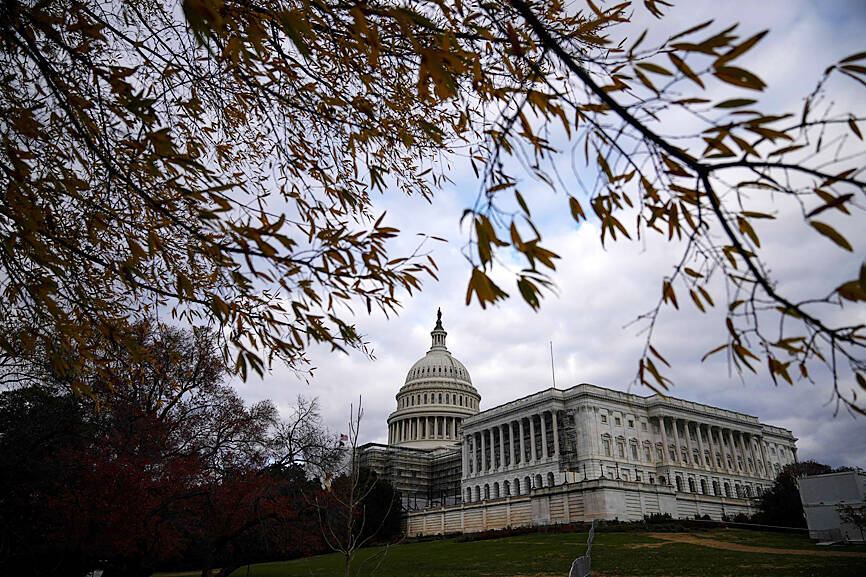The US Senate Armed Services Committee on Tuesday filed its draft of an annual defense policy bill containing provisions to bolster defense and cybersecurity cooperation with Taiwan.
The draft, the National Defense Authorization Act (NDAA), which the committee approved in a bipartisan 24-1 vote on June 23, would authorize US$876.8 billion for military and national defense programs at the US departments of defense and energy.
It is to be debated in the Senate.

Photo: AFP
The bill directs the US secretary of defense to work with their counterpart in Taiwan to establish a “comprehensive training, advising and institutional capacity-building program” for Taiwan’s military forces.
The program would be aimed at enabling a “layered defense” of Taiwan by Taiwanese forces, including through the use of an asymmetric defense strategy, and would also boost interoperability between Taiwan and US forces and encourage information sharing, the bill says.
The legislation would also require US officials, including the secretary of defense and the heads of the US Cyber Command and the US Indo-Pacific Command, to engage with Taiwan on expanding military cybersecurity cooperation.
Aside from these initiatives, the draft NDAA would instruct the US Department of Defense to provide an assessment to the US Congress on how Taiwan has integrated the military capabilities it has received from the US over the previous 10 years.
It would also mandate the completion of a “comprehensive analysis of the risks and implications of a sustained military blockade of Taiwan” by China, a report that would be carried out by the secretary of defense and the chairman of the US Joint Chiefs of Staff in coordination with the US director of national intelligence.
The analysis would include an assessment of how China might execute a blockade, its possible precursors or warning signs, its potential effects on Taiwan and the US, and military and nonmilitary options for countering a blockade, the bill says.
In addition to the draft NDAA in the Senate, the US House of Representatives Armed Services Committee passed a separate version of the legislation late last month.
Typically, after the House and Senate have passed their own versions of the NDAA, they negotiate a reconciliation of the bill to send to the president to sign into law before the end of the year.

The Ministry of Economic Affairs has fined Taobao NT$1.2 million (US$36,912) for advertisements that exceed its approved business scope, requiring the Chinese e-commerce platform to make corrections in the first half of this year or its license may be revoked. Lawmakers have called for stricter enforcement of Chinese e-commerce platforms and measures to prevent China from laundering its goods through Taiwan in response to US President Donald Trump’s heavy tariffs on China. The Legislative Yuan’s Finance Committee met today to discuss policies to prevent China from dumping goods in Taiwan, inviting government agencies to report. Democratic Progressive Party Legislator Kuo Kuo-wen (郭國文) said

The Ministry of Economic Affairs has fined Taobao NT$1.2 million (US$36,900) for advertisements that exceeded its approved business scope and ordered the Chinese e-commerce platform to make corrections in the first half of this year or its license would be revoked. Lawmakers have called for stricter supervision of Chinese e-commerce platforms and more stringent measures to prevent China from laundering its goods through Taiwan as US President Donald Trump’s administration cracks down on origin laundering. The legislature’s Finance Committee yesterday met to discuss policies to prevent China from dumping goods in Taiwan, inviting government agencies to report on the matter. Democratic Progressive Party

Taiwan and its Pacific ally Tuvalu on Tuesday signed two accords aimed at facilitating bilateral cooperation on labor affairs, according to Taiwan’s Ministry of Foreign Affairs (MOFA). The governments inked two agreements in Taipei, witnessed by Foreign Minister Lin Chia-lung (林佳龍) and visiting Deputy Tuvaluan Prime Minister Panapasi Nelesone, MOFA said in a news release. According to MOFA, the agreements will facilitate cooperation on labor issues and allow the two sides to mutually recognize seafarers’ certificates and related training. Taiwan would also continue to collaborate with Tuvalu across various fields to promote economic prosperity as well as the well-being of their

Sung Chien-liang (宋建樑), who led efforts to recall Democratic Progressive Party (DPP) Legislator Lee Kun-cheng (李坤城), was released on bail of NT$80,000 today amid outcry over his decision to wear a Nazi armband to questioning the night before. Sung arrived at the New Taipei District Prosecutors’ Office for questioning in a recall petition forgery case last night wearing a red armband bearing a swastika, carrying a copy of Adolf Hitler’s Mein Kampf and giving a Nazi salute. Sung left the building at 1:15am without the armband and covering the book with his coat. Lee said today that this is a serious